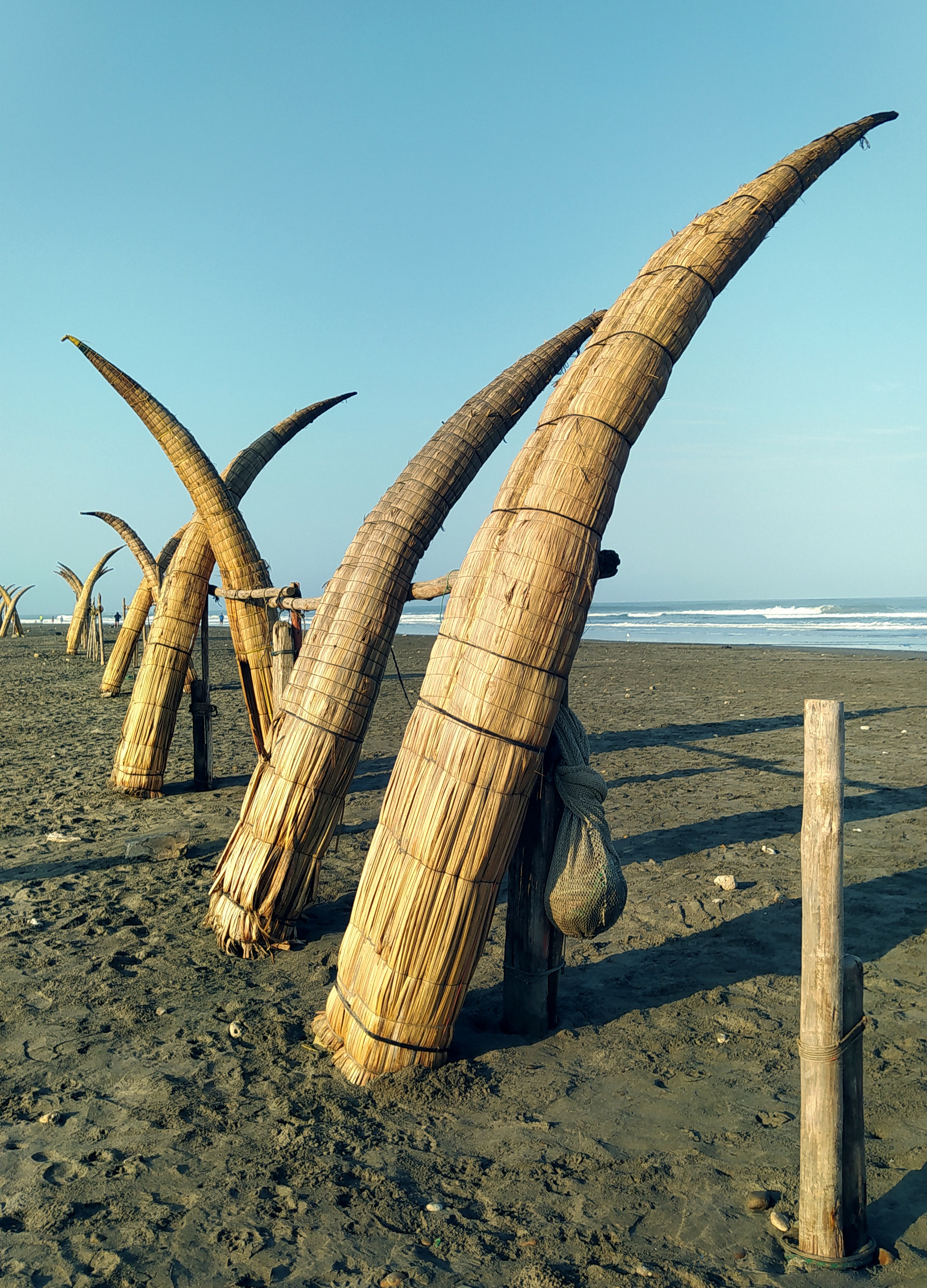Pimentel’s ‘Riders of the Sea’ Navigate Tradition and Technology

Fishers of Pimentel Beach, Peru.
In the quiet dawn of northern Peru, as the mist rises from the Pacific, apparitions emerge from the sea atop slender boats. These aren't just any vessels; they're Caballitos de totora – ‘little reed horses’ – a testament to a tradition that has endured for over three millennia.

Skilled fisher navigating the tide on Pimentel Beach.
Ancient craft, modern challenges
The fishers of Pimentel Beach are modern-day ‘riders of the sea,’ skilfully manoeuvring these handcrafted reed boats, a legacy of the ancient Moche and Chimú civilizations. These civilizations, renowned for their engineering prowess and artistic mastery, gifted the world with this unique design – a vessel unchanged for 3,000 years, a testament to their maritime ingenuity.
But tradition faces challenges. Modern fishing methods and the dwindling availability of reeds threaten this ancient practice. The Caballito de Totora Fishermen’s Association, established in 1975, is fighting to preserve their heritage while embracing a sustainable future. Their latest endeavour? A digital innovation called TrazApp.

Handcrafted reed boats.
Surfing the waves of innovation: TrazApp
José Elmer Carranza Panta, President of the association, reflects on the initial hesitation:
“Embracing new technology was challenging for us in the beginning. However, using TrazApp with WWF-Peru’s guidance helped us organize and record our fishing activities.”
Developed by WWF-Peru, TrazApp is an electronic catch documentation and traceability system. It's a digital platform that empowers everyone in the fishing industry, from fishers to processors, to track seafood ‘from bait to plate’. This traceability is crucial for ensuring food safety, legal compliance - and crucially, sustainable fishing practices.

At the TrazApp workshop for the Caballito de Totora Fishermen's Association in 2023.
A lifeline for small-scale fisheries
Recognizing TrazApp's potential to combat illegal, unreported, and unregulated (IUU) fishing, the UNDP Ocean Innovation Challenge (OIC) selected WWF-Peru’s proposal for its second cohort of ocean innovators. Peru's fisheries face significant challenges with undocumented and unregulated fishing vessels. TrazApp, with OIC's support, is working to digitize and standardize administrative processes, enhancing transparency and data management in the fishing sector.
The impact is tangible. TrazApp empowers fishing communities, like those in Pimentel, by enhancing economic independence and visibility within the supply chain.

Landing of mahi mahi at an artisanal landing site in Pucusana, Lima.
TrazApp also gained official recognition as a system for issuing fishing permits in Peru and integrated with the Peruvian Directorate of Captaincies and Coast Guards (DICAPI), logging over 1,500 official electronic departures and landings, comprising over 10,000 kilograms of diverse commercial fish species. TrazApp has not only streamlined administrative tasks, but has also given the fishers greater autonomy, as well as a better understanding of their catches and prospects for commercialization.
Building on this success, in 2024 the Ministry of Production (PRODUCE) signed an important agreement to promote interoperability with SITRAPESCA, the government's official fisheries traceability system. This ensures that the data collected by TrazApp is incorporated into official databases, contributing to a more transparent fishing sector and streamlining the documentation and authorization process for fishing vessels.

Artisanal fishing vessels, which mainly capture jumbo squids, docked at Caleta La Islilla, Piura.
A future woven from tradition and technology
Carranza's enthusiasm for TrazApp is palpable.
“My decision to adopt TrazApp has proven to be a wise one... I hope that more fishing associations will start using TrazApp to achieve organized and sustainable fishing practices.
TrazApp is helping us achieve significant goals in the fishing sector. I am grateful for the support of UNDP and WWF-Peru for this project,” he concludes.
In the heart of Peru, where ancient traditions meet modern challenges, the fishers of Pimentel ride the waves of change, embracing technology to preserve their heritage and secure a sustainable future for their community and the ocean they depend on.

To accelerate progress on SDG14, which aims to conserve and sustainably use the oceans, seas and marine resources for sustainable development, UNDP, through its Ocean Innovation Challenge is identifying, financing, advising and mentoring truly innovative, entrepreneurial and creative approaches to coastal and ocean restoration and protection.
With funding from Sweden and Norway, the OIC is actively supporting replicable and scalable approaches, and working to advance the blue economy.

 Locations
Locations



